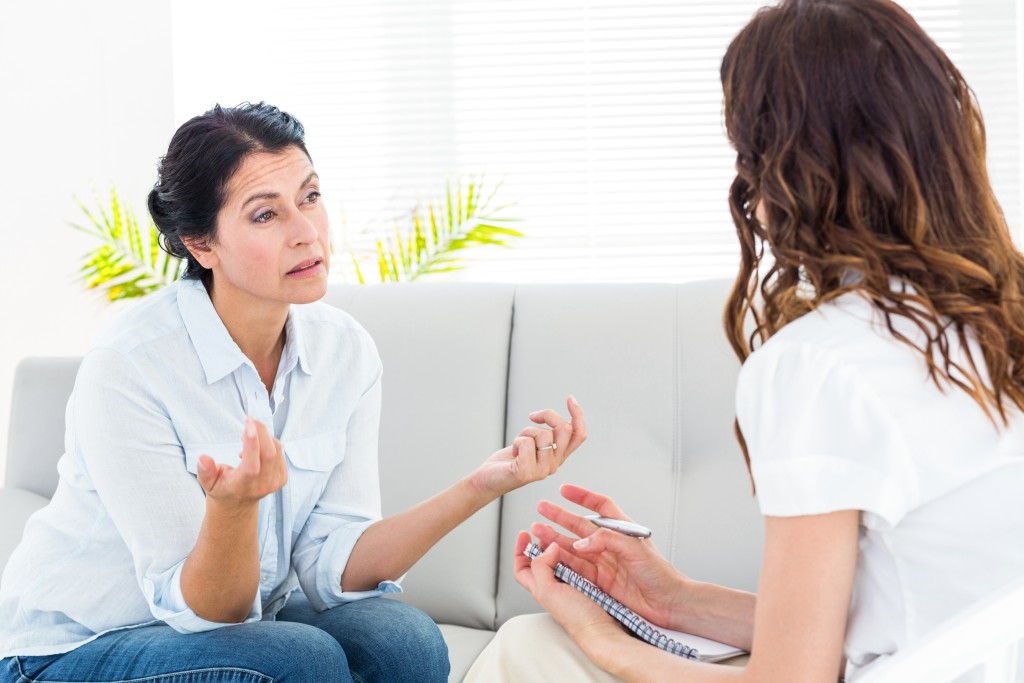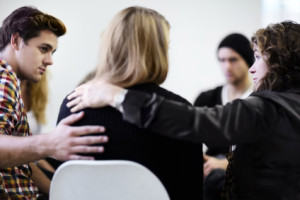- Calls to this hotline are currently being directed to Within Health or Eating Disorder Solutions
- Representatives are standing by 24/7 to help answer your questions
- All calls are confidential and HIPAA compliant
- There is no obligation or cost to call
- Eating Disorder Hope does not receive any commissions or fees dependent upon which provider you select
- Additional treatment providers are located on our directory or samhsa.gov
What to Expect in Individual and Group Therapy in Eating Disorder Treatment?

Eating disorders are serious, fatal illnesses, associated with severe disturbances in disordered eating tendencies, and the related thoughts and emotions. This is why individual therapy and group therapy are key to recovery.
Treating an eating disorder generally involves a combination of psychological and nutritional counseling, along with medical and psychiatric monitoring.
Treatment must address the eating disorder symptoms and medical consequences, as well as psychological, biological, interpersonal, and cultural forces that contribute to the eating disorder.
Group therapy for eating disorders
Group therapy consists of a group of members who are at varying stages of the treatment process. Patients discover a more profound sense of connectivity, alongside personal catharsis, and realize that they are not alone in their struggle.
Over time, as members share their experiences, common elements emerge, and personal struggles begin to appear more universal. You will identify similar experiences, how their inner voice has bullied them just like yours has, and how their relationship with their bodies and food are just as complicated as yours.
These realizations help you identify eating disorders as no longer your friend, but as a negative entity that causes you, and others, pain.
Group therapy for eating disorders include:
Professionally-led: these groups tend to be part of a formal eating disorder program where an eating disorder professional, or a psychologist, will facilitate learning, interaction, and sharing for both therapy and support.
Peer-led: Like Overeaters Anonymous, these groups tend to focus on support rather than therapy. This type of group therapy is best utilized once recovery has begun.
Cognitive behavioral therapy (CBT): this is an evidence-based eating disorder therapy highlighting triggers, behaviors, harmful perceptions, and consequences of the eating disorder. This therapy can be delivered in group or individual therapy.
The precise manner of conduct of the group sessions depends upon the therapist and what the aim is. Some may prefer a free dialogue where participation is dependent upon each participant’s discretion, or it may involve a specific plan for each session to practice new skills with other members of the group.
Individual therapy for eating disorders
Individual therapy is a joint process between a therapist and a patient. The common goal is to inspire change from harmful ways and improve quality of life.
Incorporating individual therapy, or counseling, in treatment, provides patients the opportunity to develop insight regarding the problems underlying their eating disorders. Individual therapy focuses on the emotions that are being faced presently and explore the innermost and underlying sense of self.
Eventually, the patient begins to understand how these emotions manifest themselves into the present moment. It is crucial to learn better coping strategies and implementation tools to make more informed choices and achieve a healthier lifestyle.
Patients learn to implement ways to maintain positive experiences and utilize new sentiments. This can be a particularly enlightening experience as the patient gets a new perspective on things in life.
What to expect?
Therapy is not just merely taking advice, it is learning to move forward in life with a healthier perspective. It is an essential part of recovery to explore new solutions, healthier coping skills, and explore a greater level of autonomy to take charge of life and make better choices.
This may involve learning new skills, experimenting with new behaviors, working through old, underlying issues, grieving, or letting go of things that were holding you back from reaching your desired level of well-being.
You will learn to develop a new relationship with food and a support network to help navigate you through this complex process.
Learning to listen to yourself in a more positive light and strengthening your self-awareness with a caring and experienced therapist is imperative to the recovery process.
If you or a loved one has been struggling with an eating disorder, reach out for professional help right away and get the help you need.
References:
1. https://www.verywellmind.com/individual-therapy-2671605
2. https://www.ncbi.nlm.nih.gov/pmc/articles/PMC4096990/
3. https://www.healthyplace.com/eating-disorders/eating-disorders-overview/eating-disorders-therapy-psychotherapy-and-group-therapy
About the Author:

Sana graduated with a Bachelors in Economics and Management from the London School of Economics and began a career of research and writing right after. Her recent work has largely been focused upon mental health and addiction recovery.
The opinions and views of our guest contributors are shared to provide a broad perspective of eating disorders. These are not necessarily the views of Eating Disorder Hope, but an effort to offer a discussion of various issues by different concerned individuals.
We at Eating Disorder Hope understand that eating disorders result from a combination of environmental and genetic factors. If you or a loved one are suffering from an eating disorder, please know that there is hope for you, and seek immediate professional help.
Reviewed & Approved on June 21, 2019, by Jacquelyn Ekern MS, LPC
Published June 21, 2019, on EatingDisorderHope.com


